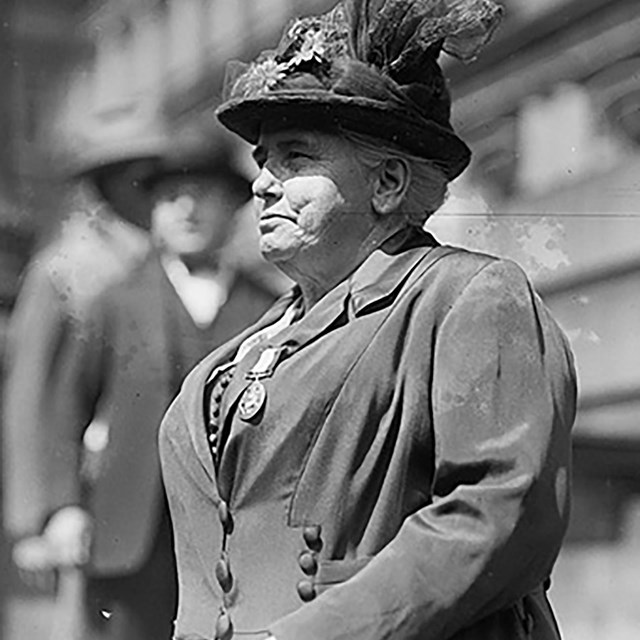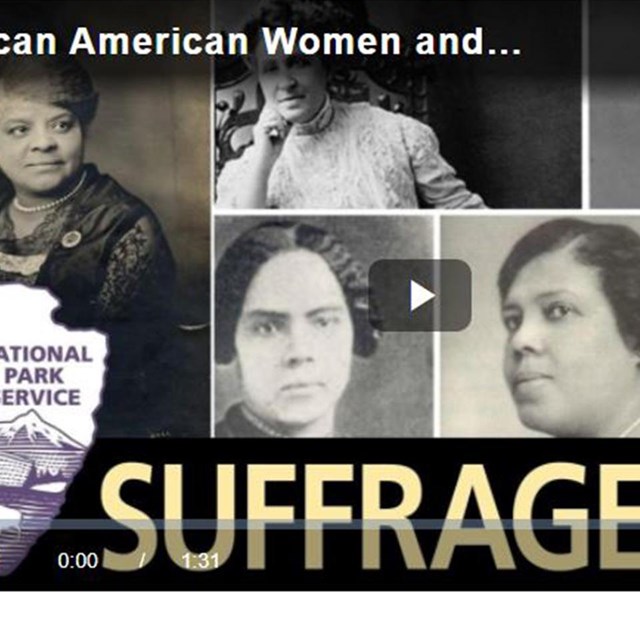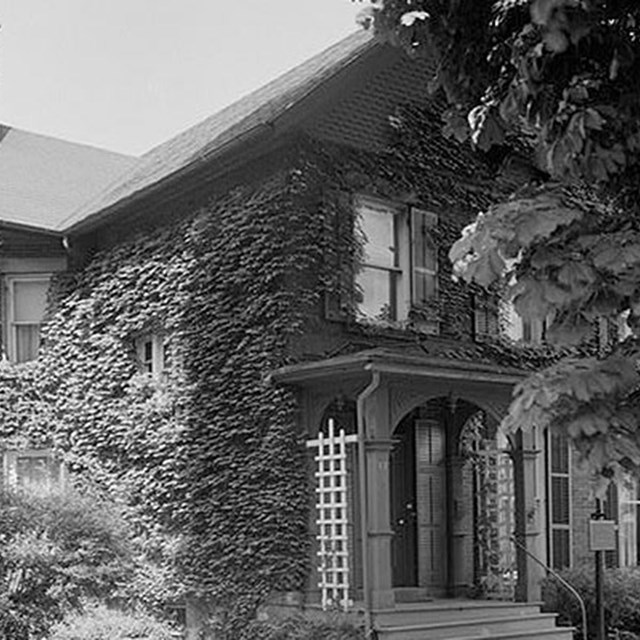Contact Us
“Fight for my rights, Aunt Susan”: 1894 and 1895
Susan and Frederick, well into their 70s, confront one another like prizefighters who don’t know when to quit. Will they finally see eye-to-eye on not only the past, but on how to agitate for a better future?
Host: Ashley C. Ford
-
The Agitators Episode 6: “Fight for my rights, Aunt Susan”: 1894 and 1895
Susan and Frederick, well into their 70s, confront one another like prizefighters who don’t know when to quit. Will they finally see eye-to-eye on not only the past, but on how to agitate for a better future?
- Credit / Author:
- WSCC, PRX, NPS
- Date created:
- 12/16/2020
ASHLEY C. FORD The Women’s Suffrage Centennial Commission, the National Park Service, and PRX present The Agitators, a play by Mat Smart. [Audio logo]Welcome to our final episode of The Agitators.
We last left Susan and Frederick at the White House in 1888 -- at the ceremony President Grover Cleveland threw for the pioneers of the women’s movement. And yes -- a Washington Post article did report that Susan’s “left hand had rested affectionately on the President’s shoulder.”
We will pick our story back up in 1894 -- six years later. But I’d like to point out a few things of note that happened during those six years we’re skipping over.
In 1889, President Benjamin Harrison appointed Frederick the Minister of Haiti. Frederick was the first African American to hold a post that high in the United States government.
Susan continued to agitate for women’s suffrage. Her lecturing and traveling schedule kept up its relentless pace, even though she was in her 70s. There were modest gains, however -- in 1890, when Wyoming became the first state to allow women to vote in all but federal elections -- and in 1893, when Colorado allowed the same.
Also, in 1893, Frederick joined Ida B. Wells -- journalist, activist, and one of the founders of the NAACP -- to protest the exclusion of African Americans in the World’s Fair in Chicago.
It’s a fact that Ida B. Wells knew both Frederick Douglass and Susan B. Anthony. Miss Wells was even a guest of Susan’s, staying at her home in Rochester for several nights in 1895.
Okay, I think that’s all you need to know. Buckle up. I’m Ashley C. Ford and this is the last episode of The Agitators.
Episode Six: “Fight for my rights, Aunt Susan.” 1894 and 1895.
The Anthony House 17 Madison Street Rochester, New York December 23, 1894
[It is six-and-a-half years later. The front room of Susan’s house. It is a cold, blustery Rochester winter morning. FREDERICK, now 76 years old, waits. He looks at a scrap book of photographs and newspaper articles. FREDERICK hums the same four notes from the beginning of the play. He cannot remember any more of it. SUSAN, now 74 years old, enters with a present behind her back.]
SUSAN . . . Have you found your mother’s song?
FREDERICK . . . Not yet. What is this?
SUSAN A present.
FREDERICK Quakers do not celebrate Christmas.
SUSAN But you do.
[FREDERICK pulls the yarn or ribbon from the gift. He takes off the brown paper. He opens the lid of the box.]
FREDERICK Ice skates?
SUSAN Ice skates!
FREDERICK Did you give me the wrong box?
SUSAN I thought we might go ice skate on the Genesee River. The river being frozen over is the one good thing about winter here.
FREDERICK I do not know how to ice skate.
SUSAN Would you like to learn? – after Mary returns from the market?
FREDERICK Thank you, Susan, but as enticing of an offer as this is – to learn how to ice skate at the age of seventy-six with two sisters – who are also in their seventies on a frozen river – I think I will pass. I am here, after all, for a funeral.
SUSAN . . . Perhaps another time.
FREDERICK Perhaps.
SUSAN How is Helen doing?
FREDERICK As well as she can be.
SUSAN My condolences. I am glad Helen could make it here to attend her aunt’s funeral in Honeoye. . . . I knew Helen’s family did not approve of your marriage, but this is –
FREDERICK I knew our lives together would be full of moments like this.
SUSAN You are one of the greatest men of the 19th century and yet you are not welcome at the funeral? It is deplorable.
FREDERICK While I wish I could be there, I am grateful to be here. Look at this article I came across in your scrapbook. “Susan B. Anthony Arrested for Voting Illegally.” I forgot that you demanded to be handcuffed.
SUSAN I most certainly did. I demanded to be treated no differently than a man.
FREDERICK You caused quite a stir.
SUSAN That was more than a stir. It was in the headlines across the country for the better part of a year.
FREDERICK And it happened right here at 17 Madison Street.
SUSAN To think – one time in our lives – we both voted: On November the 5th, 1872, you and I cast our ballots for President Grant. If only both of our actions were legal.
FREDERICK . . . How long ago did we meet?
SUSAN More than forty-five years ago now.
FREDERICK Hard to believe.
SUSAN Indeed.
FREDERICK Feels more like fifty-five or sixty. Here – let us sit.
SUSAN I am fine standing.
FREDERICK Good Lord, woman – sit! I have seen you sit two or three times in my life. How are your feet?
SUSAN Throbbing with stabbing, sharp pains – like a thousand little needles piercing.
FREDERICK Please sit.
SUSAN I am used to it.
FREDERICK Susan –
SUSAN I do not know how to sit.
FREDERICK Well, I do. Ahh. . . Will you be here in Rochester on April the 7th?
SUSAN April the 7th is a. . . Sunday. I must be in Chicago on April 1st and in Sodus for a lecture on the 10th. I will be here, yes.
FREDERICK Ida B. Wells has been invited by the black leaders here in Rochester to give a series of lectures. I can make it here on the 7th. Have you heard her speak yet?
SUSAN No.
FREDERICK Will you go with me?
SUSAN Yes, of course.
FREDERICK You opened my eyes at the White House so many years ago, but it is Ida B. Wells who has awakened my soul. Her investigative journalism on lynchings has caused a great agitation. Most people in the North have no idea of the prejudice and terror that continues now in the South. Miss Wells is – Why are you pacing?
SUSAN There is a business matter I must discuss with you. You know it was not my wish to have the National convention in Atlanta next month. I believe it should always be in D.C., where we are in arm’s length of congress and can easily pull on their ears.
FREDERICK You have made that clear. But I believe there is a great good to accomplish in Atlanta.
SUSAN . . . You know that the National does not have any jurisdiction over local chapters’ restrictions on membership. [SUSAN sits down] The Georgia Chapter has decided to prohibit black women from attending the convention. This is why I did not want to have the convention in the South.
FREDERICK Let us invite the black women anyway. Let us take the fight to them.
SUSAN There are millions of white, Southern women who have yet to join the movement. With their support and financial backing, with them convincing their husbands to vote for woman suffrage, it could turn the tide in this fight.
FREDERICK Yes, but –
SUSAN The local officers explicitly said, if colored women were at the convention, their white constituents would not attend. I hate this. But the convention only lasts six days – and it could make the difference in whether or not we pass the amendment that will enfranchise all women in this country forever.
FREDERICK Then let me speak. I was not planning on going to Atlanta, but I can speak on the matter of this so-called Negro problem.
SUSAN Our cause is votes for women. We cannot make the fight about anything else. You do not need to come to Atlanta.
FREDERICK How many times have you begged me to speak?
SUSAN I have not begged.
FREDERICK Strongly urged. Implored. Insisted. Well, now I am begging you. Let me speak. “Men talk of the Negro problem. There is no Negro problem. The problem is whether the American people have loyalty enough, honor enough, patriotism enough to live up to their own Constitution.” Let me speak.
SUSAN No.
[FREDERICK picks up one of the ice skates. He looks at it in his hands]
FREDERICK You misremembered the story, Susan. It was not I who wanted to ice skate, but my daughter Annie.
SUSAN I know. I only thought that –
FREDERICK “Fight for my rights, Aunt Susan.” “Fight for my rights.” When did you stop fighting for little Annie?
SUSAN I am still fighting for her.
FREDERICK But if she was still alive she could not attend this convention.
SUSAN I did not want the convention in Atlanta!
FREDERICK Then have it in D.C. instead.
SUSAN It is too late to move it to D.C.
FREDERICK Then cancel it.
SUSAN It is too late to cancel it.
FREDERICK Where is the woman who thrust out her wrists and said, “Handcuff me!”?
SUSAN It is not the right time.
FREDERICK It is always the right time to speak out against injustice! [Without thinking, FREDERICK squeezes the blade of the ice skates. He cuts the palm of his hand.]
Dammit.
SUSAN Let us get you a doctor.
[FREDERICK takes out his handkerchief and wraps his hand in it]
FREDERICK There is no need.
SUSAN Your hand is cut open.
FREDERICK I have been cut much worse.
SUSAN Please do not leave.
FREDERICK I think I must. [He goes to the door and opens it. Snow blows inside. He is about to leave, but instead he stands in the doorframe. He lets a cold gust of wind from outside to pass through him. Eventually, he steps back inside. He calmly closes the door] The oak tree said to the reeds, “How have you weathered the storm, whereas I have been torn up by the roots and hurled into the river?” “You were stubborn,” said the reeds, “and the storm proved stronger than you. But we reeds, we bow and yield to every breeze, and the gale passed harmlessly over our heads.” Earlier this year, you went to all sixty counties in New York in three months – did you not?
SUSAN Yes.
FREDERICK Sixty counties in three months – at the age of 74. In Wyoming and Colorado, women can vote in local elections. The National’s membership is larger than ever before. Perhaps what you are doing is working.
SUSAN It is.
FREDERICK You are the most famous woman in America. Perhaps in all the world.
SUSAN Queen Victoria is the most famous woman in the world.
FREDERICK Then you are second to her. People listen to you. Why sacrifice your ideals now?
SUSAN I am not sacrificing my ideals. This is a compromise.
FREDERICK This is staying silent in the face of a grave injustice.
SUSAN Were you not sacrificing your ideals in 1869? When you abandoned the women’s cause?
FREDERICK I did not abandon it.
SUSAN Nor am I abandoning black women now. Our ideals are the same – they always have been.
FREDERICK Remind me?
SUSAN To make this into a country for All.
FREDERICK Then why do we keep having the same fight over and over?
SUSAN You did not apologize to me then. I will not apologize to you now. We disagree on strategy. We did over the Fifteenth Amendment. We do today.
FREDERICK In 1869, I did what I did because I thought: this hateful, hypocritical country is not ready for equality all at once. We must get it piece by piece. I thought: the language of the Fifteenth is flawed but it is what we can get. We, the disenfranchised. And the only reason I – the only reason I sacrificed my ideals is I thought you were right behind us. I thought: women will secure the vote in four or five years – at worst, it will take ten years. That was twenty-four years ago. I thought you were right behind us, but it has been twenty-four years. Susan, if you sacrifice your ideals for six days – if you step on others to get what you want –
SUSAN Frederick –
FREDERICK If you do this – it will cost you. You may not feel it next week or next year but it will eat away at you like a cancer. I was not prepared for the cost. And I say all this to you – not out of malice – but as your dearest friend. Do not do this.
SUSAN . . . My whole life I have been told to wait. I present petitions to, literally, the grandsons of the congressmen I first presented petitions to. From the day we are born, we women are pushed aside. We are told that our voices do not matter. That we are not citizens. That we are lesser. This sacrifice could lead to the enfranchisement of all women. If you want crops, you must plow the ground. The convention must go on.
FREDERICK Lord – Will you, one day, give us the strength to fight for each other as much as we fight for ourselves? And until that day, will you please have mercy on our souls? Until that day, will you give us the strength to forgive one another? And to forgive ourselves. Amen.
SUSAN Amen.
FREDERICK . . . I will make the trip here in April to hear Ida B. Wells. I hope you will join me.
SUSAN I will.
FREDERICK Her last speech still echoes in my head. It burned into my memory when I heard it: “I long with all the intensity of my soul that mob rule shall be put down and equal justice be accorded to every citizen of this country – no matter the race – when every member of this great composite nation will be a living, harmonious illustration of the words: My country, ‘tis of thee, Sweet land of liberty Of thee I sing. Land where our fathers died, Land of the Pilgrim's pride, From every mountainside – ” [The light in the front room grows brighter and brighter. The room fills with infinite light. Nothing else can be seen]
Mount Hope Cemetery Rochester, New York April 11, 1895
[It is three months later. A beautiful, spring morning. A pleasant breeze comes and goes. SUSAN, now 75 years old, wears her red shawl. She carries her alligator purse. She goes to a grave.]
SUSAN Frederick, I wanted to tell you who is staying at our house now – at this very moment. Tomorrow, she will take the train back to Memphis. But today, she is here in Rochester and a guest at 17 Madison Street. Miss Ida B. Wells. You were right about her. I went to her lecture at First Baptist Church and she – she has lightning in her eyes and thunder in her words. After the lecture, I met Miss Wells. And she was. . . quite critical of me. She appreciated that I spoke out against discrimination in the North, but she does not understand why I seem to accept it in the South. Why I accepted it in Atlanta. “I refuse to compromise on issues of black rights,” she said. “And you should refuse to as well.” I then invited her to stay with us for the rest of her time in Rochester. “I was afraid I put you off,” she said. But I told her, “It is the trait I most desire in my friends.” We have had an extraordinary time. Until yesterday. I had to go to Sodus to give a lecture. In the morning, I told Miss Wells she could use my new stenographer for her correspondence. I did not know this young woman well. Anna Dorsey. I only knew – she was twenty years old. She was destitute and desperately needed the work. And she could type well enough. When I returned home last night, I found Miss Wells scribbling away by herself and the stenographer at leisure. I asked her, “Why is Miss Wells doing her own letters and not you?” And she plainly said, without any remorse, “I do not write letters for any colored person.” And I replied, “If you cannot oblige me by assisting a guest in my house, you cannot remain in my employ.” And this young woman, who has no home and not a penny to her name, left without another word. I was stunned. I played the scene out over and over. What would you have done, Frederick? Should I not have given her this ultimatum? How could I have done a better job at helping her see? But I gave her a choice – and she decided she would rather starve to death than be subservient to a black woman. And I decided that I could not have that hatred in my house. If these United States are ever to be truly united – How can we learn to stay in the room with the people we hate? – and who hate us. How can we be better at helping each other see? . . . There is so much work to be done and the thought of doing it without you is – But then I think of the young people around us – Anna Howard Shaw Fannie Barrier Williams Booker T. Washington Rachel Foster Avery Ida B. Wells – the list goes on and on – when I think of these fine, young agitators – and the countless ones who are not yet born, I – Failure is impossible. I finally heard your grandson Joseph play violin. It was in D.C. at a Waller’s Benefit concert. And when he began to play, I could scarcely believe my ears. He played the song you have tried to find all these years. It was unmistakable. The Mendelssohn Violin Concerto. What if – all this time – you were not hearing the past, but the song of what is to come?
[The opening notes of Mendelssohn’s Violin Concerto in E Minor ring out. It begins with the first four notes we have heard many times before. SUSAN looks at Frederick’s grave. She looks at where her own grave will be. The symphony swells beneath the VIOLINIST.]
ASHLEY C. FORD . . . This year, in 2020, Ida B. Wells posthumously received a Pulitzer Prize for her “outstanding and courageous reporting on the horrific and vicious violence against African Americans during the era of lynching.”
As a writer myself, Ida B. Wells is a hero of mine. It feels so. . . apt that our story ends with her. And that she is being recognized anew this year with a well-deserved and long-overdue Pulitzer Prize.
Frederick Douglass’ advice to young activists was simple: “Agitate, agitate, agitate.” Just like we heard him say to Susan back in the first episode.
The history of the United States – the history of securing voting rights in the United States – is a history of agitators. . . those who have come before us, like Frederick and Susan and Ida B. Wells those who are with us now and those who are yet to come.
Agitate, agitate, agitate.
I’m Ashley C. Ford. This has been The Agitators by Mat Smart, from the Women’s Suffrage Centennial Commission, the National Park Service, and PRX Productions.
The podcast adaptation was envisioned by Commission Executive Director Anna Laymon, with support from Kelsey Millay. Performances by Madeleine Lambert as Susan B. Anthony and Cedric Mays as Frederick Douglass. Directed by Logan Vaughn. Original music and score by Juliette Jones and Rootstock Republic. The production team includes Executive Producer Jocelyn Gonzales and Managing Producer Genevieve Sponsler. Post-production sound and mixing by Sandra Lopez-Monsalve and Ian Coss. Original music and score recorded, mixed, and mastered by Joshua Valleau. Vocals and heme song production by Hunter LaMar. Additional production by Brett ‘Whitenoise’ White. Additional music by Epidemic Sound. Special thanks to David Herman of Good Studio, Dan Dietrich of Wall-to-Wall Recording, and Erin Sparks and Jacob Mann at Edge Media Studios.
I’m Ashley C. Ford. To learn more about the history of the suffrage and abolition movements, visit the show’s website at GO DOT N-P-S DOT GOV SLASH suffrage podcast.
Listener Companion from the National Park Service
Find out more about the people, places, and stories from Episode Six.-
 Places of Ida B. Wells
Places of Ida B. WellsVisit several places associated with Ida B. Wells.
-
 Mill-Rae
Mill-RaeFind out more about Mill-Rae, the Philadelphia home of suffragist Rachel Foster Avery.
-
 Rev. Dr. Anna Howard Shaw
Rev. Dr. Anna Howard ShawRev. Dr. Anna Howard Shaw was an activist, physician, clergy, and President of the National American Women's Suffrage Association.
-
 Suffrage in 60 SecondsAfrican American Women and the Vote
Suffrage in 60 SecondsAfrican American Women and the VoteAfrican American women often found themselves marginalized by both Black men and white women in the fight for equality. Learn more here.
-
 On Their ShouldersNemesis: The South and the 19th
On Their ShouldersNemesis: The South and the 19thThe South was the nemesis of the woman suffrage movement, the impassioned adversary that, in 1920, almost kept the 19th from ratification.
-
 New YorkSusan B. Anthony House
New YorkSusan B. Anthony HouseSusan B. Anthony's house in Rochester, New York is open to the public as part of the National Susan B. Anthony Museum and House.
Credits
This was The Agitators by Mat Smart, from the Women’s Suffrage Centennial Commission, the National Park Service, and PRX Productions.The podcast adaptation was envisioned by Commission Executive Director Anna Laymon, with support from Kelsey Millay.
Performances by Madeleine Lambert as Susan B. Anthony and Cedric Mays as Frederick Douglass.
Directed by Logan Vaughn. Original music and score by Juliette Jones and Rootstock Republic. The production team includes Executive Producer Jocelyn Gonzales and Managing Producer Genevieve Sponsler. Post-production sound and mixing by Sandra Lopez-Monsalve and Ian Coss.
Original music and score recorded, mixed, and mastered by Joshua Valleau. Theme song production by Hunter LaMar. Original music and score recorded, mixed, and mastered by Joshua Valleau. Vocals and Theme song production by Hunter LaMar. Additional production by Brett ‘Whitenoise’ White. Overture sound design by David Lamont Wilson. Additional music by Epidemic Sound. Special thanks to David Herman of Good Studio, Dan Dietrich of Wall-to-Wall Recording, and Erin Sparks and Jacob Mann at Edge Media Studios.
Last updated: December 16, 2020

